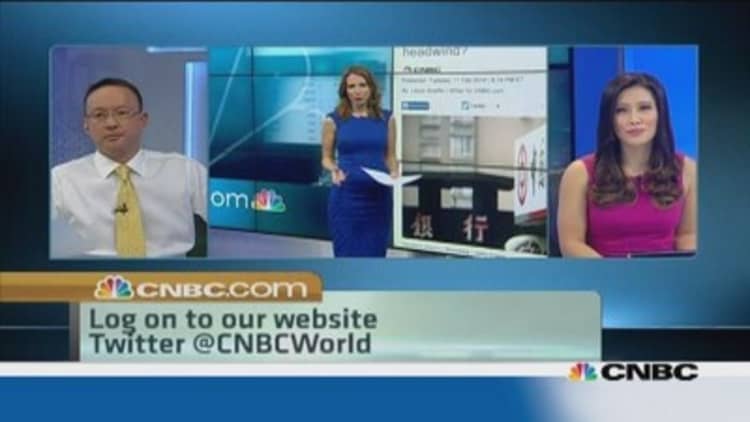
China's banking sector, already under the shadow of a credit crackdown and concerns over bad debt, may face a new headwind with the country's Internet players entering – and disrupting – the market.
"China's internet giants are mobilizing millions of individuals to take on the big banks, forcing well-fed bankers to cough up a fair deal on yields on cash deposits that conventionally have been taken as a given under the existing suppressed deposit rate regime," Steve Wang, chief China economist at financial services group Reorient, said in a note.
(Read more: China's shadow banking woes are 'exaggerated')
In the past six months, Yuebao – a venture under the wing of Internet giant Alibaba – raised around 250 billion yuan ($41.3 billion) from money market investments offering rates much higher than the around 3 percent benchmark time-deposit rates. The offering has become China's largest fund product.
Starting this Friday, pre-registered Yuebao account holders will be able to put money into a principal-protected 12-month term deposit with an expected yield of 7 percent, Wang noted.
"Aggressive marketing campaigns and strong willpower to turn brick-and-mortar banks upside down characterize China's online warriors," Wang said. "Creative disruptions to the traditional banking sector will gain, not fade, in the coming year."
(Read more: Why China isn't ready to let trust investments fail)
The new offerings are able to get one up on traditional banks in much the same way e-commerce players have often managed to out-compete bricks-and-mortar peers. Wang noted the online-only platforms can cut the cost of doing business by eliminating physical branches, avoiding check processing and hiring fewer people.
The disruption to the banking status quo may well play into China's efforts to liberalize the sector.
"This is how China is going to deregulate interest rates," Erwin Sanft, head of China equity research at Standard Chartered, said. "There's a willingness to allow interest rates to go up to get better allocation of capital," he said, noting that keeping credit too cheap has led to debt problems.
(Read more: China's Brokerages Turn Shadow Banks)

"It's important to get deregulation sooner rather than later," he said. "Money has been mispriced."
But he isn't sure the Internet players will necessarily be a hugely disruptive force in the sector. "At the moment, the growth looks pretty explosive," Sanft said. "There's a closet tendency to extrapolate (the growth). In reality, this is an added pressure to deregulate interest rates earlier."
Once the rates are deregulated, the differential between the banks and the new online players likely will shrink into one market, he said. "Everything comes under one umbrella," he said.
Others also expect the online players' "disruptive" effects on the banking sector may be limited.
(Read more: The risky China assets you may want to own)
"The threat they pose to banks might not be as large as it appears," Leon Qi, an analyst at Daiwa, said in a note.
In the near term, he expects the Internet players won't be able to continue offering such high returns as short-term rates moderate on a seasonal basis after the Lunar New year holiday.
"Over the longer term, we think that to compete vigorously with bank deposits, Internet players such as Alibaba are likely to face constraints on their own capital in order to provide immediate liquidity and satisfy regulatory requirements," Qi said.
—By CNBC.Com's Leslie Shaffer; Follow her on Twitter @LeslieShaffer1

